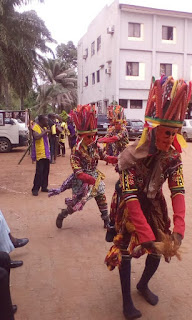Tuesday, June 21, 2016
A cultural renaissance as Afenmai Masquerades and dance troupe dazzle in Benin
As legendary Reggae artiste, Bob Marley, once sang in Buffalo Soldier, sang philosophically “If you know your history, you will know where you are coming from.” Even though Bob Marley was referring to a people’s culture, it is regrettable that the importance of Marley’s statement does not go beyond its lyrics to many, especially the younger generations of today, as they strive ever further for their definition of Western enlightenment.
It is not uncommon to hear people still talk about societal values. But most times, some of them do not actually understand what those values stand for, let alone their origin. This is largely because the influence of Western civilisation and globalisation has not only impacted negatively on the cultural heritage of African societies, but has completely eroded most aspects of the people’s culture. For example, most children of today, including some adults, are increasingly finding it difficult to speak their mother tongue (local dialects), let alone write them . Reasons are not far fetched: they have now adopted English and other foreign languages as their medium of communication. Bad as it may appear, however, efforts are still being made to preserve our cultural heritage, something we are passionate about at Viva Naija. Many individuals and institutions have taken it upon themselves to revive the cultural heritage. Now, there is interest in preservation rather than the culture going extinct. Now that is good news! One such individual is Prince (Alhaji) Usman Abudah, a veteran journalist, who, in an effort to preserve the cultural heritage of the Afenmai People of Edo State, founded the Afenmai Heritage and Cultural Studies, to showcase Assembly of Afenmai Masquerades and Traditional Troupes annually.
Recently, a special edition of the Masquerades and Traditional Dance Troupes featured at the Edo State Nigeria Union of Journalists (NUJ) Press Centre in Benin, where five cultural troupes, namely Abgeloje Dance Troupe, Ogbona Masquerade, Oyase Obomeje, (soloist), Ogbona Female Singers, and Egbogio Dance Troupe performed. Even though they were different in their names, lyrics, dance steps and costume, but the resounding phenomena in their various performances, the troupes were entertaining, educating, informing to the public in their own unique ways. Through their well-choreographed dance steps and lyrics, the guests were entertained, as the elderly among them were nostalgic about the good old days when such displays were common.
Besides the entertaining aspect of our cultural heritage depicted through dancing and folktales, such troupes have provided employment to those who have taken cultural dance as a profession.
Subscribe to:
Post Comments (Atom)




No comments:
Post a Comment